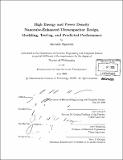High energy and power density nanotube-enhanced ultracapacitor design, modeling, testing, and predicted performance
Author(s)
Signorelli, Riccardo (Riccardo Laurea)
DownloadFull printable version (16.85Mb)
Other Contributors
Massachusetts Institute of Technology. Dept. of Electrical Engineering and Computer Science.
Advisor
Joel Schindall and John Kassakian.
Terms of use
Metadata
Show full item recordAbstract
Today's batteries are penalized by their poor cycleability (limited to few thousand cycles), shelf life, and inability to quickly recharge (limited to tens of minutes). Commercial ultracapacitors are energy storage systems that solve these problems by offering more than one million recharges with little capacitance degradation, recharge times on the order of few seconds, and unlimited shelf life. However, today's ultracapacitors are limited by their low energy stored per unit of volume and weight (5% that of a lithium ion battery), and their high cost (ten times greater than that of lithium ion batteries) per unit of energy stored. This thesis presents vertical carbon nanotubes-based electrodes designed to achieve, when packaged into an ultracapacitor cell, a four to seven times higher power density (7.8 kW/1) and a five times higher energy density (31 Wh/1) than those of activated carbon-based ultracapacitors. Models to predict the energy density, power density, and efficiency of an ultracapacitor cell using vertical carbon nanotube electrodes of a given morphology are described. The synthesis of carbon nanotube electrodes fabricated on thin conducting substrates of tungsten and aluminum that have the target nanotube average diameters and lengths is described along with insights on the thermodynamics of the nanotube growth reaction. The low pressure chemical vapor deposition reactor used to fabricate nanotube electrodes on conducting substrates is described. Electrochemical measurements of electrodes are presented to corroborate electrochemical modeling leading to the performance prediction of carbon nanotube-based ultracapacitors. Finally, some key remaining questions to further advance the understanding of nanotubes as electrode materials for ultracapacitor are presented.
Description
Thesis (Ph. D.)--Massachusetts Institute of Technology, Dept. of Electrical Engineering and Computer Science, 2009. Cataloged from PDF version of thesis. Includes bibliographical references (p. 161-164).
Date issued
2009Department
Massachusetts Institute of Technology. Department of Electrical Engineering and Computer SciencePublisher
Massachusetts Institute of Technology
Keywords
Electrical Engineering and Computer Science.